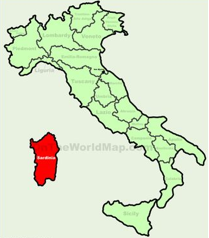Typical product : Casu Frasigu
- 19 mars 2019
- 2 min de lecture
Casu Fragizu is a typical cheese product of the island Sardinia, in Italy. Made with sheep’s milk, its consistency can be soft or creamy depending on the activity of a particular fly’s larvae, Piophila Casei, which grow inside the cheese.
Depending on the number of larvae, the texture can be more or less homogeneous and creamy. Once the presence of the larvae is verified, the cheese is opened on the top to control the fermenting process. Once fermentation is completed, the product is entirely creamy with a strong and pungent odor and taste. The shape is cylindrical, the weight can vary between 2 and 4 kilograms, and the color varies between white/slightly yellow and slightly brown.
Since the presence of fly larvae is the primary characteristic of this product, a few precautions need to be taken. The time of brine, compared to that of other cheeses, is reduced; it is necessary to find the balance between the amount of salt needed to prevent the development of bacterial fermentation, while at the same time maintaining a friendly environment for the flies. The pressing process is soft and sometimes small holes, covered in olive oil, are made in the cheese’s crust to soften it further and attract more flies. In some cases, the turning process can also be limited.
Once the larvae are born, the dough is minced to facilitate their growth while cheese wheels are piled on top of each other to ease flies’ transition between them. Temperature is an essential criterion for the production of Casu Fragizu, so production starts at the end of the spring season and ends in autumn.
This type of cheese is mostly produced by sheep farmers in a room where a particular microclimate based on specific temperatures and air humidity is continuously maintained. The final product is stocked in cooler rooms or fridges.
The European Union has banned Casu Fragizu because it does not respect its food hygiene-health regulations. However, some Sardinians farmers sell it on the black market, where it is bought for double the price of an ordinary wheel of pecorino cheese. Attempts have been made to circumvent the EU ban by having the Casu Fragizu declared a traditional food (it has been made in the same manner for more than 25 years, and it is therefore exempt from ordinary food hygiene regulations). The traditional way of making the cheese is explained by an official paper of the local Sardinian government. Also, in 2005, sheep farmers and researchers of the University of Sassari developed a more sanitary method of production with the hope of allowing the legal sale of the cheese. At the moment, however, these efforts have not yet achieved the desired results.
Bibliography
"Casu frazigu – Formaggi" (PDF) (in Italian). Regione autonoma della Sardegna – ERSAT: Ente Regionale di Sviluppo e Assistenza Tecnica. Archived (PDF) from the original on 22 July 2011. Retrieved 29 October 2010.
Frauenfelder, Mark (2005). "Most Rotten Cheese". The World's Worst: A Guide to the Most Disgusting, Hideous, Inept, and Dangerous People, Places, and Things on Earth. Chronicle Books. pp. 22–23. ISBN 978-0-8118-4606-6.




































Commentaires